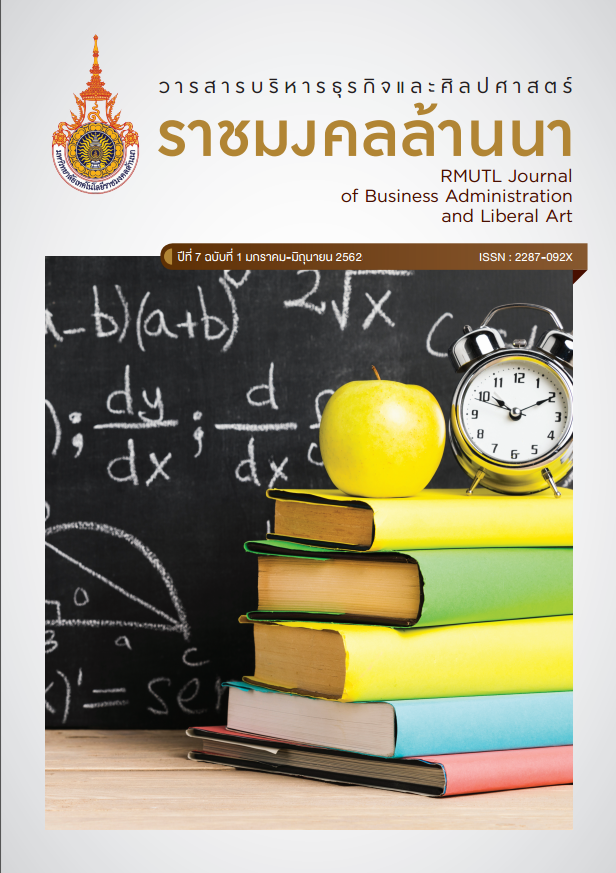Exploratory Factors Analysis for Knowledge Management Systems in a Faculty of Business Administration, Bangkokthonburi University
Main Article Content
Abstract
The purpose of this study were to study the operational level of knowledge management and exploratory factor analysis for the development of knowledge management system in faculty of business administration, Bangkokthonburi University. The sample in the study were consisted of 350 lecturers and students in faculty of business administration, Bangkokthonburi University by using the surveys as the tool for researching. The data were analyzed by exploratory factor analysis with principal component extraction and varimax rotation. The study found that: 1) the operational level of knowledge management in overall aspects were at high level ( = 3.97, S.D. = .842) and 2) the elements of knowledge management as 5 factors which were the organizational culture and the knowledge management, the achievement motive and the self-efficacy, the organizational support for innovation, the organizational structure and leadership, and the knowledge transfer and knowledge acquisition. In which every elements had cumulative variance can by described as 71.241.
Article Details
บทความวิจัยนี้เป็นของลิขสิทธิ์
References
กัลยา วานิชย์บัญชา. (2552). การวิเคราะห์ข้อมูลหลายตัวแปร. พิมพ์ครั้งที่ 4. กรุงเทพฯ: สำนักพิมพ์จุฬาลงกรณ์มหาวิทยาลัย.
จงจิต วงษ์สุวรรณ, ธนินทร์ รัตนโอฬาร และปริยาภรณ์ ตั้งคุณานันต์. (2558, มกราคม-เมษายน). การวิเคราะห์องค์ประกอบของกระบวนการจัดการความรู้ของสำนักงานทรัพย์สินส่วนพระมหากษัตริย์. วารสารครุศาสตร์อุตสาหกรรม. 14 (1) : 91-95.
จุฬาลักษณ์ เตชะวัฒนกิจกุล. (2555). ปัจจัยที่ส่งผลต่อการจัดการความรู้ของพนักงาน บริษัท บริหารสินทรัพย์ กรุงเทพพาณิชย์ จำกัด สำนักงานใหญ่. วิทยาศาสตรมหาบัณฑิต (จิตวิทยาอุตสาหกรรมและองค์การ). กรุงเทพฯ: มหาวิทยาลัยรามคำแหง.
ชัชวาลย์ วงษ์ประเสริฐ. (2548). การจัดการความรู้ในองค์กรธุรกิจ. กรุงเทพฯ: ธรรกมลการพิมพ์.
เชิดวงศ์ หงส์ศรีจินดา. (2557). การพัฒนาระบบจัดการความรู้ส่วนบุคคลที่ใช้สัญญาการเรียนรู้และเพื่อนช่วยเพื่อนเพื่อส่งเสริมความสามารถในการทางานวิชาการของนิสิตระดับบัณฑิตศึกษา. ปริญญาครุศาสตรดุษฎีบัณฑิต (เทคโนโลยีและสื่อสารการศึกษา). กรุงเทพฯ: จุฬาลงกรณ์มหาวิทยาลัย.
ทินกร ทองสินธุ์, พงศ์สัณห์ ศรีสมทรัพย์, โกวิทย์ พวงงาม และวีระพล สุวรรณนันต์. (2557, กันยายน – ธันวาคม). ปัจจัยที่มีอิทธิพลต่อการจัดการความรู้ของพนักงานเทศบาลนครในประเทศไทย. วารสารดุษฎีบัณฑิตทางสังคมศาสตร์ (ฉบับมนุษยศาสตร์และสังคมศาสตร์). 4 (3) : 77-91.
บดินทร์ วิจารณ์. (2547). การจัดการความรู้ สู่ปัญญาปฏิบัติ. กรุงเทพฯ: เอ็กซเปอร์เน็ท.
บรรพจน์ ทัพซ้าย. (2554). แนวทางการจัดการความรู้ในโรงเรียนประถมศึกษา สังกัดสำนักงานเขตพื้นที่การศึกษาประถมศึกษากาฬสินธุ์ เขต 3. ปริญญาศึกษาศาสตรมหาบัณฑิต (การบริหารการศึกษา). ขอนแก่น: มหาวิทยาลัยขอนแก่น.
ปุณิกา เจียมทอง, มธุรส ผ่านเมือง, ชนนิกานต์ รอดมรณ์ และนลินภัสร์ ปรวัฒน์ปรียกร. (2559). การวิเคราะห์องค์ประกอบเชิงสำรวจในการขับเคลื่อนระบบชุมชนนักปฏิบัติ. การประชุมวิชาการระดับชาติด้านคอมพิวเตอร์และเทคโนโลยีสารสนเทศ ครั้งที่ 12. 7-8 กรกฎาคม, 64-69.
พรรณี ลีกิจวัฒนะ. (2553). วิธีวิจัยทางการศึกษา. พิมพ์ครั้งที่ 5. กรุงเทพฯ: คณะครุศาสตร์อุตสาหกรรม สถาบันเทคโนโลยีพระจอมเกล้าเจ้าคุณทหารลาดกระบัง.
ภราดร จินดาวงศ์. (2549). การจัดการความรู้. กรุงเทพฯ: ซีดับบลิว พริ้นติ้ง.
มธุรส ผ่านเมือง และนลินภัสร์ ปรวัฒน์ปรียกร. (2561, กรกฎาคม-สิงหาคม). การทบทวนวรรณกรรมอย่างเป็นระบบในการค้นหาปัจจัยและแนวทางในการเก็บเกี่ยวประโยชน์จากระบบสารสนเทศ. วารสารวิทยาศาสตร์และเทคโนโลยี. 26 (4) : 715-729.
วันวิสาข์ คงทน. (2556, เมษายน-มิถุนายน). ปัจจัยที่มีอิทธิพลต่อการจัดการความรู้ของบุคลากรฝ่ายสารสนเทศคณะแพทยศาสตร์ศิริราชพยาบาล. วารสารวิทยบริการ, 24 (2) : 112-128.
อดุลเดช ถาวรชาติ, ไพศาล สรรสรวิสุทธิ์ และพิสิษฐ์ จอมบุญเรือง. (2555, กันยายน – ธันวาคม). ปัจจัยที่ส่งผลต่อการจัดการความรู้ของบุคลากรในมหาวิทยาลัยราชภัฏนครสวรรค์. วารสารวิชาการบัณฑิตศึกษา มหาวิทยาลัยราชภัฎนครสวรรค์. 7 (20) : 123-136.
Chena, C.J. & Hung, S.W. (2010). To Give or to Receive? Factors Influencing Members’ Knowledge Sharing and Community Promotion in Professional Virtual Communities. Information & Management. 47 (4) : 226–236.
Cummings, T.G. & Worley, C.G. (2009). Organization Development & Change. South Melbourne, Vic. Thomson.
Hair, J. F., et al. (2010). Multivariate Data Analysis: A Global Perspective. 7thed ed. New Jersey: Prentice-Hall.
Hicks, R.C., Dattero, R. & Galup, S.D. (2006, January- February). The Five-tier Knowledge Management Hierarchy. Journal of Knowledge Management. 10 (1) : 19-31.
Jason, W.O. & David, C.F. (2012). Replication Analysis in Exploratory Factor Analysis: What it is and why it makes your analysis better. Practical Assessment, Research & Evaluation. 17 (15) : 1-8.
Jennex, M. E., Smolnik, S. and Croasdell, D.T. (2009). Towards a consensus knowledge management success definition. The Journal of Information and Knowledge Management Systems. 39 (2) : 174-188.
Madanmohan, R. (2005). Knowledge Management Tools and Techniques: Practitioners and Experts Evaluate KM Solutions. UK : Elsevier Butterworth-Heinemann.
Mao, H., et al. (2016). Information Technology Resource, Knowledge Management Capability, and Competitive Advantage: The moderating role of Resource Commitment. International Journal of Information Management. 36 (2016) : 1062-1074.
Nicolás, C.L. & Cerdán, L.M. (2011, December). Strategic Knowledge Management, Innovation and Performance. International Journal of Information Management. 31 (6) : 502–509.
Pee, L. G. & Kankanhalli, A. (2016). Interactions among Factors Influencing Knowledge Management in Public-sector Organizations: A resource-based View. Government Information Quarterly. 33 (2016) : 188-199
Petrova, G. I., et al. (2015). Knowledge Management as a Strategy for the Administration of Education in the Research University. Social and Behavioral Sciences. 166 (2015) : 451-455.
Taherdoost, H., Sahibuddin, S. & Jalaliyoon, N. (2014, May). Exploratory Factor Analysis; Concepts and Theory. Advances in Applied and Pure Mathematics. 375-382.
Turban, E., Leidner, D., McLean, E. & Wetherbe, J. (2007). Information Technology for Management: Transforming Organizations in the Digital Economy. 6th Ed. New Jersey: John Wiley & Sons.
Yap, L.S., Tasmin, R., Rusuli, M.S.C. & Hashim, N. (2010, April). Factors Influencing Knowledge Management Practices among Multimedia Super Corridor (MSC) organizations. Communications of the IBIMA. 2010 : 1-12.
Zhenga, W., Yangb, B. & McLean, G.N. (2009, July). Linking Organizational Culture, Structure, Strategy, and Organizational Effectiveness: Mediating Role of Knowledge Management. Journal of Business Research. 63 (7) : 763–771.

